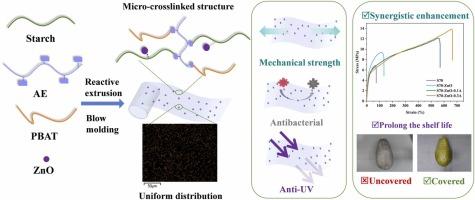淀粉/PBAT/ZnO纳米复合膜的微交联改性及其在食品保鲜中的应用
IF 6.2
1区 农林科学
Q1 AGRICULTURAL ENGINEERING
引用次数: 0
摘要
基于淀粉和ZnO纳米颗粒的抗菌生物降解食品包装材料的最新进展推动了可持续塑料替代品的发展;然而,高淀粉含量造成的加工性差、机械缺陷和纳米颗粒迁移风险等挑战仍然存在,限制了它们的实际应用。本文选择ZnO纳米粒子作为抗菌剂,设计了一个微交联网络来桥接70 wt%增塑型羟丙基二淀粉磷酸(HPS)和聚己二酸丁二酯(PBAT)。微交联网络不仅提高了熔体强度,改善了可加工性,而且使相结构从松散的层状形态转变为紧凑的双连续结构。这种结构转变增强了界面相容性,并与ZnO纳米粒子的增强作用协同提高了力学性能。拉伸强度达到14.1 MPa,断裂伸长率提高8.4倍,达到684 %,超过了大多数PBAT/热塑性淀粉(TPS)共混物。更值得注意的是,ZnO优异的抗菌活性和抗紫外线能力使牛油果的保质期延长至16天,微交联结构减少了ZnO的迁移量(<10 mg/dm²),确保了食品安全。这项工作突出了微交联工程的潜力,以推进高性能,环保食品包装系统。本文章由计算机程序翻译,如有差异,请以英文原文为准。

Micro-crosslinking modification of starch/PBAT/ZnO nanocomposite films and its application in food preservation
Recent progress in antibacterial biodegradable food packaging materials based on starch and ZnO nanoparticles has advanced sustainable plastic alternatives; however, challenges such as poor processability from high starch content, mechanical deficiencies, and nanoparticle migration risks persist, limiting their practical applications. Herein, ZnO nanoparticles were selected as the antibacterial agent, and a micro-crosslinking network was engineered to bridge 70 wt% plasticized hydroxylpropyl distarch phosphate (HPS) and poly(butylene adipate-co-terephthalate) (PBAT). The micro-crosslinked network not only enhances melt strength, improving processability, but also transforms the phase structure from a loose layered morphology to a compact bicontinuous architecture. This structural transformation enhances interfacial compatibility, and its combination with the reinforcement effect of ZnO nanoparticles synergistically improves mechanical performance. The tensile strength reaches 14.1 MPa, while the elongation at break increases 8.4 times, reaching 684 %, which surpasses most reported PBAT/thermoplastic starch (TPS) blends. More notably, the excellent antibacterial activity and UV resistance of ZnO extend the shelf life of avocado to 16 days, and the micro-crosslinking structure reduces the migration amount of ZnO (<10 mg/dm²), which ensures food safety. This work highlights the potential of micro-crosslink engineering to advance high-performance, eco-friendly food packaging systems.
求助全文
通过发布文献求助,成功后即可免费获取论文全文。
去求助
来源期刊

Industrial Crops and Products
农林科学-农业工程
CiteScore
9.50
自引率
8.50%
发文量
1518
审稿时长
43 days
期刊介绍:
Industrial Crops and Products is an International Journal publishing academic and industrial research on industrial (defined as non-food/non-feed) crops and products. Papers concern both crop-oriented and bio-based materials from crops-oriented research, and should be of interest to an international audience, hypothesis driven, and where comparisons are made statistics performed.
 求助内容:
求助内容: 应助结果提醒方式:
应助结果提醒方式:


